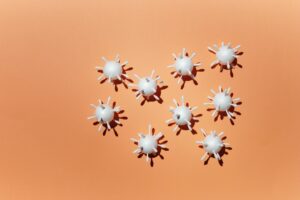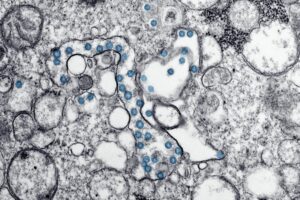Effective Methods for Managing Acne | Advice on Skin Care
Discover effective strategies to combat acne and achieve clearer skin. Learn how to deal with acne using proven methods and expert skincare tips for lasting results.
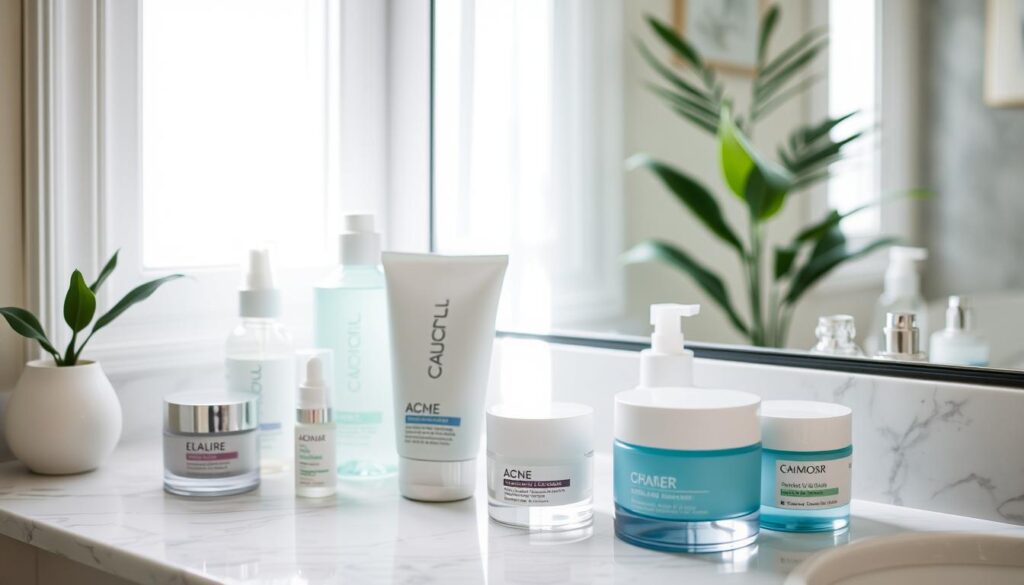
Acne is a common skin issue that affects people of all ages. It can cause frustration, make you feel self-conscious, and make you want clear, healthy skin. Luckily, there are ways to manage and treat acne effectively. This guide will show you how to fight acne and get the glowing skin you want.
If you’re dealing with constant breakouts or want to keep your skin clear, this article has what you need. We’ll talk about the causes of acne, how to use skincare products, and making lifestyle changes. We’ll give you a full plan to handle this common skin problem.
Key Takeaways
- Identify the underlying causes of acne, including hormonal imbalances and genetic factors
- Discover effective cleansers and topical treatments to address acne-prone skin
- Explore the role of diet and stress management in managing acne breakouts
- Develop a personalized skincare routine tailored to your skin’s unique needs
- Learn to avoid common acne triggers and adopt lifestyle habits that promote clear skin
Understanding the Causes of Acne
Acne is a common skin issue that affects many people around the world. The exact reasons for acne differ from person to person. Knowing what causes acne is key to managing and preventing it.
Hormonal Imbalances and Acne
Hormonal changes are a big reason for acne. Hormones like testosterone help make oil in the skin. When hormone levels go up, the skin makes too much oil. This can block pores and help bacteria that cause acne grow.
Genetics and Acne Susceptibility
Some people are more likely to get acne because of their genes. Genetic factors affect how the skin reacts to acne bacteria. If your family has acne, you might get it too.
Other things can also cause acne, like stress, some medicines, and diet. Knowing what causes acne helps people take steps to prevent it and get clearer skin.
“Acne is a complex condition with many potential contributing factors, but by understanding the root causes, individuals can develop personalized strategies to address and prevent breakouts.”
How to Deal with Acne: A Comprehensive Approach
Acne is a common skin issue that can be tough to handle. But, with the right acne treatment methods, you can see big improvements. A full approach that uses different techniques can help manage acne well.
Understanding what causes acne is key to fighting it. A good plan combines skincare, diet changes, and lifestyle tweaks. This way, you can control your acne and get skin that looks clear and healthy.
Customized Skincare Routine
A key part of fighting acne is a skincare routine made just for you. It might include acne-fighting cleansers, topical treatments, and other products based on your skin type and acne level.
Dietary Adjustments
What you eat can affect your acne. Changing your diet can help your acne treatment methods work better. It’s part of a holistic acne solutions.
- Reduce intake of processed foods, refined carbs, and sugary drinks
- Eat more whole, nutrient-rich foods with antioxidants and anti-inflammatory effects
- Drink lots of water
Lifestyle Changes
Healthy habits can also help with acne. Stress management, good hygiene, and avoiding acne triggers are important for managing acne well.
- Try stress-reducing activities like meditation, yoga, or deep breathing
- Keep a regular, gentle cleansing routine to avoid clogged pores
- Avoid things that can cause acne, like certain makeup or environmental factors
Using a full approach to acne treatment methods helps tackle acne from all angles. This strategy lets you take charge of your skin health. You’ll see clearer, more confident-looking skin.
https://www.youtube.com/watch?v=ys_R4KZYj24
Skincare Routine for Acne-Prone Skin
For those with acne-prone skin, a consistent skincare routine is key. Using the right cleansers and treatments can help you get clear, healthy skin.
Cleansers for Acne
Choosing the right cleanser is crucial for acne-friendly skincare. Look for acne cleansers with salicylic acid, benzoyl peroxide, or tea tree oil. These ingredients help clear pores, reduce inflammation, and fight acne-causing bacteria.
- Salicylic acid-based cleansers help exfoliate the skin, removing excess oil and dead skin cells that can lead to breakouts.
- Benzoyl peroxide cleansers kill bacteria on the skin’s surface that cause acne.
- Tea tree oil cleansers are gentle but powerful, with antibacterial and anti-inflammatory properties for acne-prone skin.
Acne-Fighting Topical Treatments
Using the right acne cleanser is just the start. Adding acne-fighting products and topical acne treatments to your routine can tackle breakouts from the inside out. Ingredients like:
- Retinoids help unclog pores and speed up cell turnover.
- Benzoyl peroxide fights bacteria that cause acne.
- Salicylic acid exfoliates and controls oil production.
Start with a low concentration of these ingredients and slowly increase as your skin gets used to them. This helps avoid dryness or irritation.
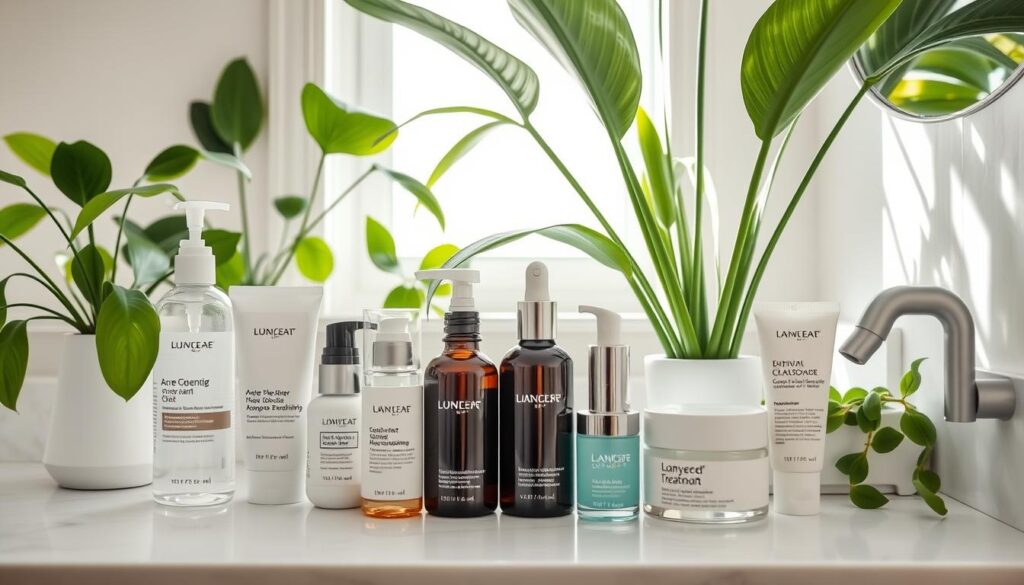
“Consistency is key when it comes to managing acne. By incorporating the right acne cleanser and acne-fighting products into your daily routine, you can take a proactive step towards clear, healthy-looking skin.”
The Role of Diet in Managing Acne
When it comes to acne, what you eat matters a lot. Studies show that your diet can affect how severe your acne is. By eating acne-fighting foods and avoiding certain foods, you can help your skin stay clear and healthy.
Some nutrients in your diet can really help your skin. Vitamins, minerals, and antioxidants in nutrition for clear skin can balance hormones, reduce swelling, and help your skin heal. Foods that are great for fighting acne include:
- Fatty fish, such as salmon and mackerel, which are rich in omega-3 fatty acids
- Leafy greens, berries, and other fruits and vegetables high in vitamins A, C, and E
- Probiotic-rich foods, like yogurt and fermented vegetables, which support gut health
- Nuts and seeds, which provide a range of essential nutrients and healthy fats
But, some foods can make acne worse. These include:
- Refined carbohydrates and sugary foods
- Dairy products, particularly those from non-organic sources
- Greasy or fried foods high in unhealthy fats
By changing your diet and eating more acne-fighting foods, you can manage your acne better. This can lead to clearer, more radiant skin.
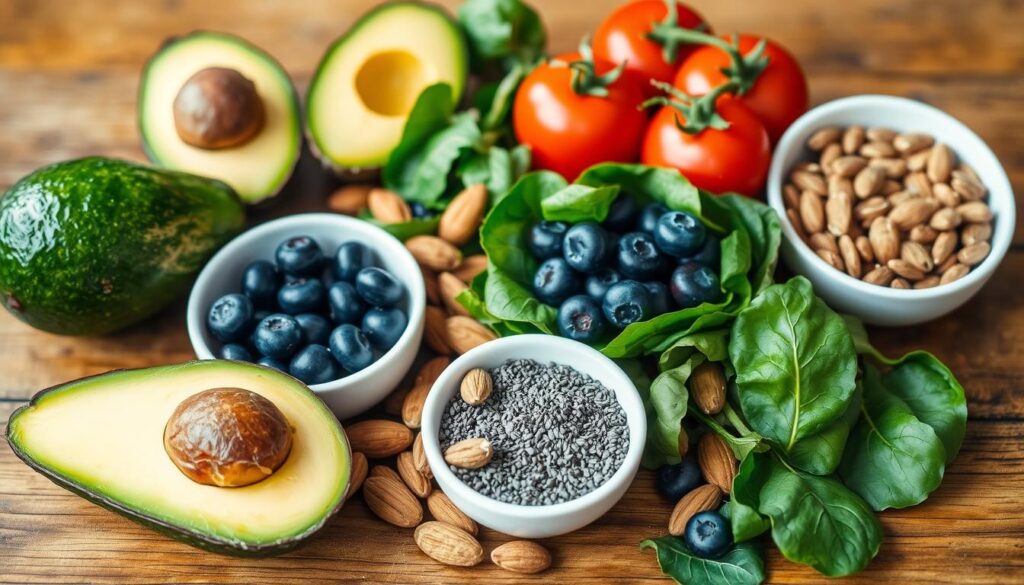
“Proper nutrition is the foundation for healthy, glowing skin. By nourishing your body with the right diet and acne-fighting foods, you can take a significant step towards managing and preventing acne breakouts.”
Lifestyle Changes to Reduce Acne Breakouts
Managing acne means looking at many aspects of your life. Making smart lifestyle changes can help reduce breakouts and improve your skin’s health.
Stress Management for Clear Skin
Stress can really affect your skin, leading to acne. Using stress-reducing methods like meditation, yoga, or exercise can help. These activities lower stress and protect your skin from acne.
By taking care of yourself and finding healthy ways to cope, you can help your skin stay clear and healthy.
Avoiding Acne Triggers
Knowing and avoiding acne triggers is key to clear skin. Some products, environmental factors, and foods can make acne worse. Choosing non-comedogenic products and being careful with new skincare items can help.
Eating a diet full of fruits, veggies, and whole grains also supports your skin’s health. This can lower your chance of getting acne.

